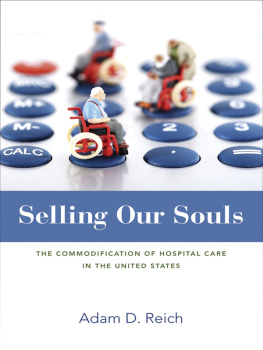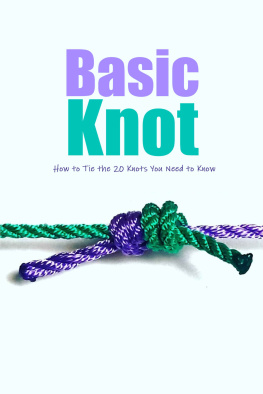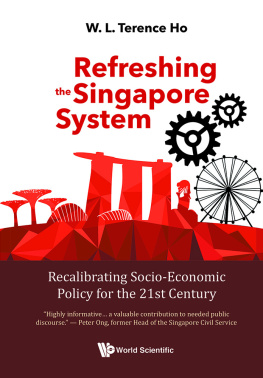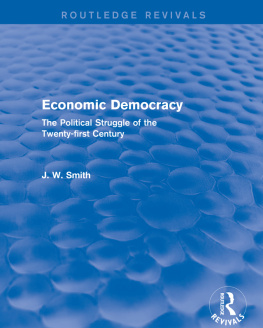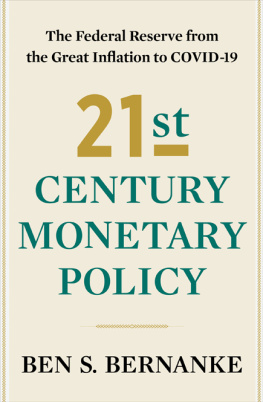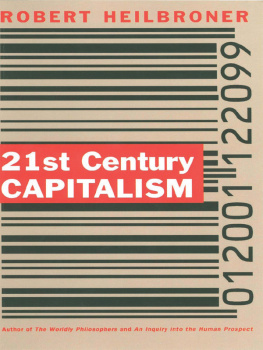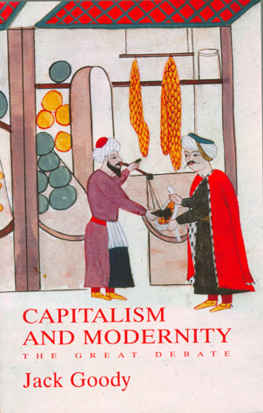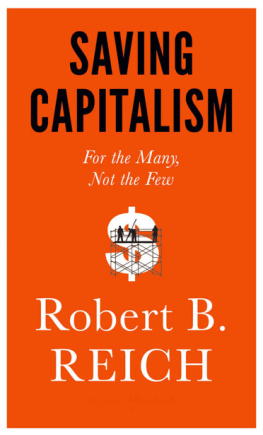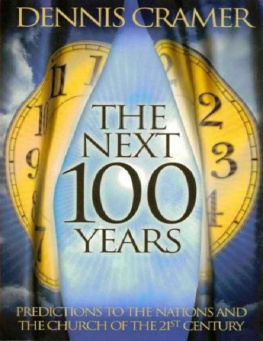Reich - The work of nations : preparing ourselves for 21st century capitalism
Here you can read online Reich - The work of nations : preparing ourselves for 21st century capitalism full text of the book (entire story) in english for free. Download pdf and epub, get meaning, cover and reviews about this ebook. City: New York, year: 2011, publisher: Vintage Books, genre: Politics. Description of the work, (preface) as well as reviews are available. Best literature library LitArk.com created for fans of good reading and offers a wide selection of genres:
Romance novel
Science fiction
Adventure
Detective
Science
History
Home and family
Prose
Art
Politics
Computer
Non-fiction
Religion
Business
Children
Humor
Choose a favorite category and find really read worthwhile books. Enjoy immersion in the world of imagination, feel the emotions of the characters or learn something new for yourself, make an fascinating discovery.

The work of nations : preparing ourselves for 21st century capitalism: summary, description and annotation
We offer to read an annotation, description, summary or preface (depends on what the author of the book "The work of nations : preparing ourselves for 21st century capitalism" wrote himself). If you haven't found the necessary information about the book — write in the comments, we will try to find it.
The work of nations : preparing ourselves for 21st century capitalism — read online for free the complete book (whole text) full work
Below is the text of the book, divided by pages. System saving the place of the last page read, allows you to conveniently read the book "The work of nations : preparing ourselves for 21st century capitalism" online for free, without having to search again every time where you left off. Put a bookmark, and you can go to the page where you finished reading at any time.
Font size:
Interval:
Bookmark:
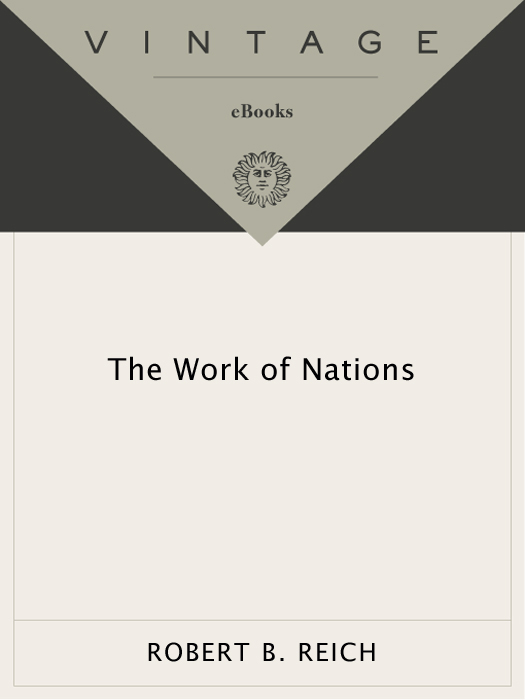
THE WORK OF NATIONS
Provocative heartening convincing The Work of Nations is well worth reading. It is packed with stimulating ideas.
Boston Globe
Robert Reich has written an elegant and penetrating analysis of the forces that are leading to the globalization of the international system and to the growing anachronism of thinking solely in national terms. More importantly, his book compels us to think about the disturbing potential consequences of these trends, as well as of ways to be better prepared to meet them.
Paul Kennedy, author of
The Rise and Fall of the Great Powers
There is much information in Reichs Work of Nations to stimulate our thoughts, and propel them well into the next century and beyond.
Orlando Sentinel
Reichs agenda remains a vigorous and welcome redefinition of modern liberalism. He seeks nothing less than a redefinition of our national myths in ways that make sense in the current world an original thinker and creative analyst.
Commonweal
Reichs analysis is quite original. [His] imagery is frighteningly on the mark. His shift of the debate beyond quick-fix management devices and annual policy choices is path-breaking.
Washington Monthly
The Work of Nations offer[s] good information and interpretation. The book is engaging, readable.
Voice Literary Supplement
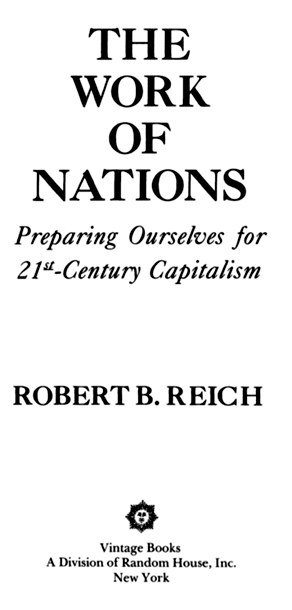
First Vintage Books Edition, February 1992
Copyright 1991, 1992 by Robert B. Reich
All rights reserved under International and Pan-American Copyright Conventions. Published in the United States by Vintage Books, a division of Random House, Inc., New York, and simultaneously in Canada by Random House of Canada Limited, Toronto. Originally published in hardcover by Alfred A. Knopf, Inc., New York, in 1991.
Library of Congress Cataloging-in-Publication Data
Reich, Robert B.
The work of nations : preparing ourselves for 21st century
capitalism / Robert B. Reich.
p. cm.
eISBN: 978-0-307-77299-2
1. United StatesEconomic conditions1981
2. Economic forecastingUnited States.
3. CapitalismUnited States.
4. International economic relations. I. Title.
HC106.8.R456 1992
337.73dc20 91-50223
v3.1
To the memory of Frances Freshman
Patriotism is easy to understand. It means looking out for yourself by looking out for your country.
CALVIN COOLIDGE
Afterword: National Identity
in a Post-Soviet World
T HIS book is the product of several years of research, interviews, and discussions, undertaken with many people whose insights appear on almost every page. To thank them adequately would take up much of the space in this volume. Some of them occupy responsible positions in business and government, here and abroad. I list their organizational affiliations at the end of the book, but I have usually refrained from identifying them by name in the text. Others are scholars and academicians, less squeamish about receiving credit where it is due. Jack Donahue, David Ellwood, Bill Hogan, Lawrence Katz, Frank Levy, John Meyer, David Riesman, Dani Rodrik, Robert Solow, Laura DAndrea Tyson, Raymond Vernon, and Shirley Williams provided helpful comments on earlier drafts. I am also grateful to several diligent students. Paul Ameer, Karen Kornbluh, Tom Pendry, and Kim Walesh persisted against all odds in tracking down obscure data and sources. John Heilemann sharpened both my prose and my ideas so gracefully that he spared me the realization of how dull they were to begin with. Several friends subjected earlier drafts to the sort of withering criticism that only friends can be trusted to provide. Here, James Dillon, Doug Dworkin, John Isaacson, Marc Lackritz, Bennett Marks, Dorothy Robyn, and Erik Tarloff played their customary role. Robert Wright and Martin Peretz of The New Republic, Alan Webber of the Harvard Business Review, and Jack Beatty and Bill Whitworth of The Atlantic all encouraged me to develop earlier versions of several of the ideas contained herein. Katie McDermott, Margaret Brooke, Scott Samenfeld, and Alison Thompson provided much-needed technical support; Jeff Faux and the Economic Policy Institute, much-needed financial support; Rafe Sagalyn and Bill Leigh, much-needed advice. Through it all, Clare Dalton tolerated my obsessive musings, and assured me that the fever would pass. Not the least, I am indebted, as before, to Jonathan Segal, my editor and friend, for his encouragement, thoughtfulness, and kindness.
R OBERT B. R EICH
Cambridge, Massachusetts
November 1990
The National Idea
W E ARE living through a transformation that will rearrange the politics and economics of the coming century. There will be no national products or technologies, no national corporations, no national industries. There will no longer be national economies, at least as we have come to understand that concept. All that will remain rooted within national borders are the people who comprise a nation. Each nations primary assets will be its citizens skills and insights. Each nations primary political task will be to cope with the centrifugal forces of the global economy which tear at the ties binding citizens togetherbestowing ever greater wealth on the most skilled and insightful, while consigning the less skilled to a declining standard of living. As borders become ever more meaningless in economic terms, those citizens best positioned to thrive in the world market are tempted to slip the bonds of national allegiance, and by so doing disengage themselves from their less favored fellows. This book describes this economic transformation, and the stark political challenge it presents.
W ITH numbing regularity we hear of the gross national product, the nations trade balance, the nations rate of economic growth, the nations savings rate, the nations unemployment rate, national productivity, the value of the nations assets, the profitability of the nations corporations. Incumbent politicians point to some figures with pride; their challengers point to others (and sometimes even the same ones) with dismay. It has become a national sport. Each new set of figures brings a frenzy of speculation: Are we doing better or worse? Is another nation beating us? Are we pulling ahead? What does this mean for our economic future? Numerous talking heads (mine included) appear on television and solemnly deliver the indispensable answers.
The optimists point ever upward: Look at the number of new jobs Marvel at all the small entrepreneurial firms! Wonder at the number of new patents in exotica like monoclonal antibodies and digital optics! Take pride in all the foreign capital pouring into the nation as a result! The economy is booming as never before! The pessimists point downward: Bemoan the loss of manufacturing. Bewail the trade deficit, and our huge debt to the rest of the world. Abhor the loss of assets to foreigners. The economy is collapsing around us.
Who is correct? Are we becoming better off or worse off? Where are we heading?
It depends on whom you mean by we.
Underlying all such discussion is the assumption that our citizens are in the same large boat, called the national economy. There are different levels of income within the boat, of course (some citizens enjoy spacious staterooms while others crowd into steerage). Yet all of us are lifted and propelled along together. The poorest and the wealthiest and everyone in between enjoy the benefits of a national economy that is buoyant, and we all suffer the consequences of an economy in the doldrums.
Font size:
Interval:
Bookmark:
Similar books «The work of nations : preparing ourselves for 21st century capitalism»
Look at similar books to The work of nations : preparing ourselves for 21st century capitalism. We have selected literature similar in name and meaning in the hope of providing readers with more options to find new, interesting, not yet read works.
Discussion, reviews of the book The work of nations : preparing ourselves for 21st century capitalism and just readers' own opinions. Leave your comments, write what you think about the work, its meaning or the main characters. Specify what exactly you liked and what you didn't like, and why you think so.


